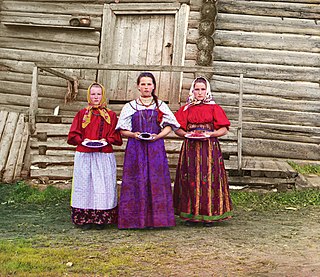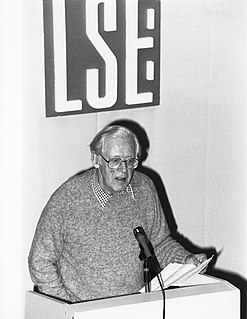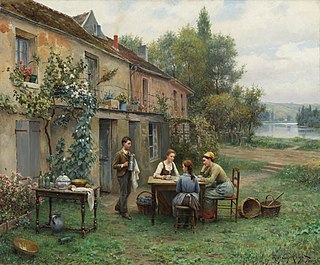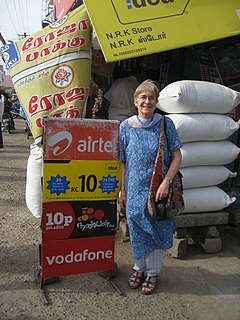Related Research Articles
Agrarianism is a social philosophy or political philosophy which values rural society as superior to urban society and the independent farmer as superior to the paid worker, and sees farming as a way of life that can shape the ideal social values. It stresses the superiority of a simpler rural life as opposed to the complexity of city life.

A peasant is a pre-industrial agricultural laborer or farmer, especially one living in the Middle Ages under feudalism and paying rent, tax, fees, or services to a landlord. In Europe, peasants were divided into three classes according to their personal status: slave, serf, and free tenant. Peasants either hold title to land in fee simple, or hold land by any of several forms of land tenure, among them socage, quit-rent, leasehold, and copyhold.
Maurice Herbert Dobb was a British economist at Cambridge University and a Fellow of Trinity College, Cambridge. He is remembered as one of the pre-eminent Marxist economists of the 20th century.

Rodney Howard Hilton, FBA was an English Marxist historian of the late medieval period and the transition from feudalism to capitalism. He was born in Manchester and studied at Balliol College Oxford University and was a member of the Communist Party Historians Group before leaving the party in 1956 with many others. He had a 36-year teaching career at the University of Birmingham. His papers are held at the University of Birmingham Special Collections.

In mainstream economic theories, the labour supply is the total hours that workers wish to work at a given real wage rate. It is frequently represented graphically by a labour supply curve, which shows hypothetical wage rates plotted vertically and the amount of labour that an individual or group of individuals is willing to supply at that wage rate plotted horizontally.

Giovanni Arrighi was an Italian scholar of political economy and sociology, and from 1998 a Professor of Sociology at Johns Hopkins University. His work has been translated into over fifteen languages.
Robert Paul Brenner is a professor emeritus of history and director of the Center for Social Theory and Comparative History at UCLA, editor of the socialist journal Against the Current, and editorial committee member of New Left Review. His research interests are Early Modern European History; economic, social and religious history; agrarian history; social theory/Marxism; and Tudor–Stuart England.
Ronald Philip Dore was a British sociologist specialising in Japanese economy and society and the comparative study of types of capitalism. He was an associate of the Centre for Economic Performance at the London School of Economics and was a fellow of the British Academy, the Japan Academy, and the American Academy of Arts and Sciences. The citation for his eminent scholar award from the Academy of International Business describes him as "an outstanding scholar whose deep understanding of the empirical phenomena he studied and ability to build on it to develop theoretical contributions are highly respected not only by sociologists but also by economists, anthropologists, historians, and comparative business systems scholars".
Alfredo Saad-Filho is a Marxian economist.

Rural history is an interdisciplinary field of historical research which focuses on the history of rural societies. At its inception, the field was based on the economic history of agriculture. Since the 1980s it has become increasingly influenced by social history and has diverged from economically-focused "agricultural history". It can be considered an equivalent of urban history.
Political Marxism (PM) is a strand of Marxist theory that places history at the centre of its analysis.
The Journal of Peasant Studies, subtitled Critical Perspectives on Rural Politics and Development, is a bimonthly peer-reviewed academic journal covering research into the social structures, institutions, actors, and processes of change in the rural areas of the developing world. It is published by Routledge and the editor-in-chief is Saturnino "Jun" Borras Jr..
The Brenner debate was a major debate amongst historians during the late 1970s and early 1980s, regarding the origins of capitalism.
Stuart Edward Corbridge, FRGS is a British geographer and academic specialising in geopolitics, development studies, and India. Since September 2015, he has been Vice-Chancellor and Warden of Durham University. From 2013 to 2015, he was Provost and Deputy Director of the London School of Economics. He was also Professor of Development Studies at LSE.
Stavros D. Mavroudeas is a Greek economist working in the tradition of Political Economy. He is currently Professor of Political Economy at the Department of Economics of the University of Macedonia in Thessaloniki, Greece. His work in political economy has focused on Marxist Political Economy, Development Economics, Labour Economics, History of Economic Thought and Greek Economic History. He has written on economic crises, Greek macroeconomic policy, growth theory, economics of the European integration, postmodernist economics, Regulation Approach and radical institutionalist theories.
Theory of Imperialism concerns the global systemic outcomes of the tendency for the rate of profit to fall in the capitalist system, and the objective impact of the consequences of those dynamics, and counter-tendencies in the world economy which are now generally associated with Marxian economics. As such it is often considered distinct and differentiated from the history of imperialism that extends through earlier historic periods and economic formations. J. A. Hobson's liberal critique of the emerging phenomenon has been considered as seminal by many writers on the subject, preceding and influencing Hilferding, Lenin "the principal English work on imperialism" and Luxemburg's formulations and teaching.

Barbara Harriss-White is an English economist and emeritus professor of development studies. She was trained in geography, agricultural science, agricultural economics and self-taught in development economics. In the 1990s, she helped to create the multi- and inter- disciplinary thematic discipline of development studies in Oxford Department of International Development; and in 2005-7 founded Oxford’s Contemporary South Asia Programme. She has developed an approach to the understanding of Indian rural development and its informal economy, grounded in political economy and decades of what the economic anthropologist Polly Hill called ‘field economics’
References
- ↑ SOAS: Department of Economics: Professorial Research Associate Terry Byers
- ↑ http://www.blackwellpublishing.com/pdf/joac002.pdf Bernstein, H. and Byres, T. J. (2001), From Peasant Studies to Agrarian Change. Journal of Agrarian Change , 1: 1–56. (Accessed May 2011)
- ↑ Byres, Terence J., 1994. ‘The Journal of Peasant Studies: Its Origins and Some Reflections on the First Twenty Years’. In The Journal of Peasant Studies: A Twenty Volume Index 1973–1993, eds Henry Bernstein, Tom Brass and T.J. Byres, with Edward Lahiff and Gill Peace, 1–12. London: Frank Cass.
- ↑ Meliczek, Hans(1999), Book Reviews. Development and Change, 30: 381–406.